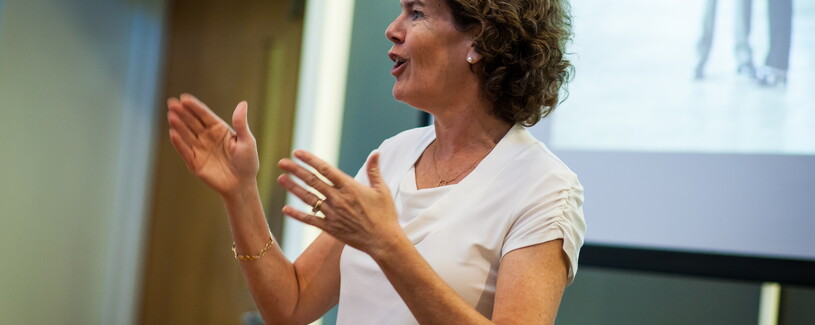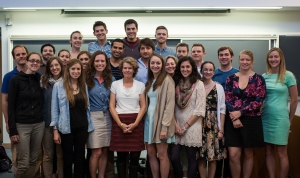Joint degrees in action: Jackie Roberts on building strong business-environment partnerships

What does it take to convince McDonald's to green its packaging? Or get steelworkers to advocate a carbon tax?
On campus for her 25th SOM reunion last week, Jackie Roberts set aside time to speak with current students about her path from engineering to initiating the Environmental Defense Fund's (EDF) Corporate Partnership program. As a part of CBEY's Leadership Development speaker series, Roberts's 9/20 talk on Learning the Language of Business and the Environment: Economic Development, Balance Sheets, and the Micro-economics of Sustainability dealt not only with the skills she gained while at FES and SOM, but also with the tools she thinks tomorrow's leaders will need.
We need managers!
Speaking to the crowd about how she got to where she is now, Roberts explained that with an interest in how things work, she was an engineering major with an eye on a law degree as an undergrad at Yale. Once she saw where she'd end up with that law degree, though, the dream fizzled. Thankfully, a mentor opened her eyes to the fact that the environmental field had plenty of great scientists, activists, and lawyers, but it didn't have enough good managers, and she headed back to Yale for the joint degree program. While there were only three people in the joint degree program then, and she might have done things differently if she were to do it all over again, she said that she can trace her career back to the exposure and network she got while pursuing her Master's degrees.
Top on her list of skills learned while at SOM and FES that helped her stand out and succeed in the long run were an understanding of how to manage a project, microeconomics, the ability to build relationships with people from the business and environmental communities, a science-based approach to environmental problems, and an understanding of how to creatively think across disciplines. While some of this became clear over time, she quickly found ways to apply them when she was given the job of helping McDonald's find greener ways to approach their product line at EDF. For one, she could now manage a project effectively, keeping it on schedule, under budget. She knew the engineering side of things, but also understood the business bottom line, and could argue for more than just greenwashed environmental solutions. After identifying the company's iconic clamshell packaging as the biggest area of opportunity, she was able to quickly help McDonald's transition to a recycled version. Not only was this one of the first successful corporate-environmental partnerships, it was also the birth of the Roberts-helmed Corporate Partnership program at EDF. No small feat for a newly minted MBA/MEM.
Business and the Environment: making the odd couple work
Focused on identifying areas where environmental improvements could be made in production, procurement, manufacturing and spec-ing processes, the EDF program was the first of its kind. Roberts told those of us in the audience that it was possible only because she and her team focused on science-based problems, approached businesses using their own language, emphasized company growth opportunities, and knew how to work on efficient timelines. On the other hand, she spoke to the need for the program's work to be environmentally legitimate by recognizing companies' efforts on specific projects while not giving them passes for other environmentally destructive practices.
Over time, Roberts worked with a huge spectrum of companies to connect them with science and solutions to environmental issues. Recently, though, she was tapped to switch gears further to head up EDF's Smart Power Program, where she works to help highlight tangible, applicable renewable energy solutions to businesses and governments. In this work, she said, she continues to see the same themes - that being creative, contextual, and pragmatic are the best ways to solve problems, whether it's using microeconomics to place dots on a US map showing the breadth and depth of the clean energy economy, or using steelworkers as forceful cap and trade proponents. Looking forward, although Washington gridlock can get frustrating, Roberts said that she sees nothing but more opportunity for businesses to be sustainability drivers.
Core competencies here and now
Having spent her career navigating a wide variety of issues, personalities and systems, Roberts was eager to give her insights into the skills required of those wanting to make a difference through sustainable business.
- Communication, communication, communication. In business, you've got to be able to find compelling ways to relate to customers, stockholders, CEOs and workers.
- Along those lines, she wishes she had focused on marketing earlier on, and highly recommends knowing how to sell a product.
- Being able to manage a project, process, and people, has been invaluable, and she still sees that demand.
- Biomimicry and advanced materials - she thinks that's where a huge amount of innovation is going to happen.
- Understand how things are made through production.
- When entering a new field, ask questions of the people on the ground. People like talking about themselves and it'll give you an understanding of how the rubber meets the road.
- Find new metrics for solutions.
- Keep in touch with the Yale network. Every time Roberts needed to understand a business approach or an environmental impact, she had SOM and FES alums to lean on

Big thank you to Jackie for sharing her experiences and advice!
Next up on the CBEY calendar, make sure to check out the newest Natures Returns webinar on 10/1 and the Sobotka Research Seminar on 10/2!